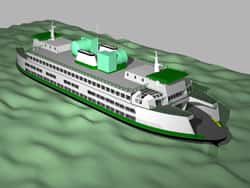 The Washington State Department of Transportation is working with Norway-based risk management firm DNV to examine the potential for converting Washington State Ferries' (WSF) vessels to run on liquefied natural gas (LNG).
The Washington State Department of Transportation is working with Norway-based risk management firm DNV to examine the potential for converting Washington State Ferries' (WSF) vessels to run on liquefied natural gas (LNG).
Through a request-for-proposals process, WSF selected DNV to specifically handle the safety and security plan, risk assessment and operational manual for its LNG conversion project. WSF – the biggest ferry operator in the U.S. and the third biggest in the world – has been pursuing the LNG initiative for several months.
WSF's initial quotes have pegged the delivered price (via tank truck) of LNG to its vessels as $0.75/gallon. This compares to a current price of diesel of approximately $3.34/gallon (as of late January). WSF says it consumes more than 17 million gallons of fuel annually, representing 30% of its operating budget. A switch from diesel to LNG would yield fuel cost savings of 40% to 50% percent at today's pricing.
LNG also offers significant emissions improvements: an approximately 100% reduction in particulate matter and sulfur oxides, 80% reduction in nitrogen oxide and 20% reduction in carbon dioxide.
WSF says it has received ‘conceptual approval’ from the U.S. Coast Guard to convert six Issaquah Class ferries to LNG. A request for proposals for these retrofits has been issued, and WSF estimates that the cost of the six conversions will be approximately $75 million. The payback period will be about seven years, and WSF says the vessels will remain in service for up to 30 years.






